Conventional freight management is based on manual communication, phone calls, and traditional broker networks. And for years, it was the standard. Although such a system worked, it was inherently bound to be problematic, being complex and lacking transparency.
With slow updates, uncertain pricing, and difficulty securing capacity, the market has reached a critical turning point. The present prospect is not about discarding old methods but upgrading the infrastructure itself.
Digital Freight Marketplaces represent this much-needed upgrade. They take the core functions of conventional logistics and optimize them by implementing real-time data and AI-driven intelligence while being fully transparent. The key is recognizing that technology now offers the control and agility required to become a leader in modern supply chain management.
Explore our freight marketplace software designed to streamline digital freight operations.
How Digital Freight Marketplaces Are Replacing Traditional Brokers?
The way logistics operates has changed a lot over the decades. Brokers who manage shipments themselves, charge fees, and negotiate prices are slowly becoming obsolete. Logistics management firms now employ algorithms to pair loads with suitable carriers through digital freight matching platforms. Businesses can now track shipments, check how carriers are doing, and study cost patterns easily.
It also helps lower idle time and empty miles, making operations run more smoothly. The objective is to enhance the whole process rather than just moving commodities. Businesses enjoy flexibility, better visibility, and smart insights, and it will be easier to respond to sudden market fluctuations with a view to maintaining costs and assuring reliable service.
See how our digital freight matching platform helps automate freight matchmaking for logistics providers.
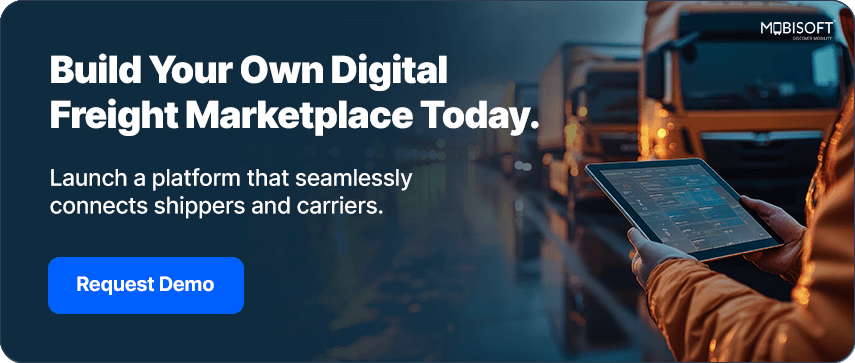
Top Factors Driving Growth of Digital Freight Marketplaces
E-commerce Growth Demands Speed
E-commerce has transformed how companies transport products. Businesses must now rapidly fulfill more orders. Freight online marketplaces assist shippers with boosting capacity on a demand-driven basis, accommodating fluctuations. This rapidness aids in satisfying demand as it occurs, as well as reducing costs for being slow.
5G and IoT Enable Real-Time Visibility
5G high-speed connectivity and advanced GPS tracking allow firms to pinpoint the exact location of the freight. Moreover, you get the expected time of arrival, possible congestions, and even resource monitoring. This level of insight results in early diagnosis in case of issues and highlights the growing digital freight marketplace trends transforming logistics visibility.
Automated Contract Management and Payments
Neither freight agreements nor invoices need any physical handling anymore. Platforms feature automated contract management, electronic signatures, and real-time payments. This minimizes errors, saves time, as well as promotes compliance across geographies, showcasing key digital freight platform benefits that improve transparency and efficiency.
Operational Resilience and Nearshoring
More attention is being given to resilient supply chains. Localizing production and having various routes are gaining prominence. Online freight exchanges assist such strategies by offering access to flexible carriers and various routes as required.
Together, they do more than contribute to expansion. They create the groundwork for fully digital, data-driven freight operations that offer flexibility, efficiency, and control to businesses, demonstrating the value of digital marketplaces for freight forwarders and shippers alike.
The Intelligence Core: AI, Blockchain, and Predictive Analytics
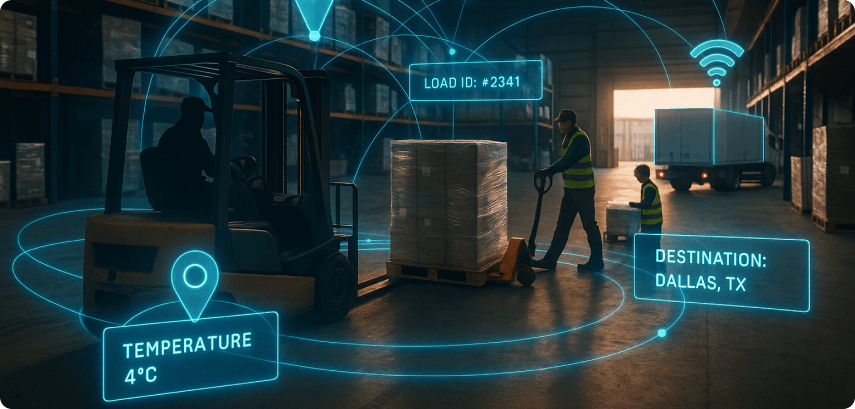
Artificial Intelligence Optimizes Operations
- Digital logistics solutions now examine history and real-time data in order to pair loads, forecast prices, and schedule shipments efficiently.
- This minimizes deadheading as well as ensures efficient utilization of capacities.
- With anticipation of increases in demand, AI ensures that carriers as well as shippers are better prepared to avoid delays.
Blockchain Secures Transactions
- Increasing freight transactions are being registered on blockchain platforms.
- This unchangeable, clear documentation results in fewer cases of misunderstandings.
- Contracts are now embedded with AI, which manages and supervises agreement procedures. This further removes manual labor and lesser mistakes.
Predictive Analytics Guides Decisions
- Data analysis allows stakeholders to predict probable bottlenecks, manage finances, and monitor shipments for each trip.
- Through predictive analytics, logistics teams can make modifications to their plans beforehand.
- This not only saves time and money, but also the extra effort of fixing issues on the spot.
Through data analysis, businesses can estimate demand, identify potential delays, and track shipments along their journey. Predictive insights allow logistics teams to adjust plans ahead of time instead of scrambling to fix problems after they occur. Learn how our freight management solutions help businesses enhance visibility and control through smart automation.
Integration Creates a Self-Learning Marketplace
When tools like AI, blockchain, and predictive analytics work as one, marketplaces grow intelligent. They can predict capacity gaps, map out routes, and tweak pricing strategies as needed. This mix of technology shifts freight management from reacting to solving issues to making better decisions, giving companies a clear advantage in how they operate.
The digital freight marketplace future lies in these self-learning systems, where every transaction enhances platform intelligence and operational insight.
Freight Marketplaces as Integrated Ecosystems for Smarter Logistics
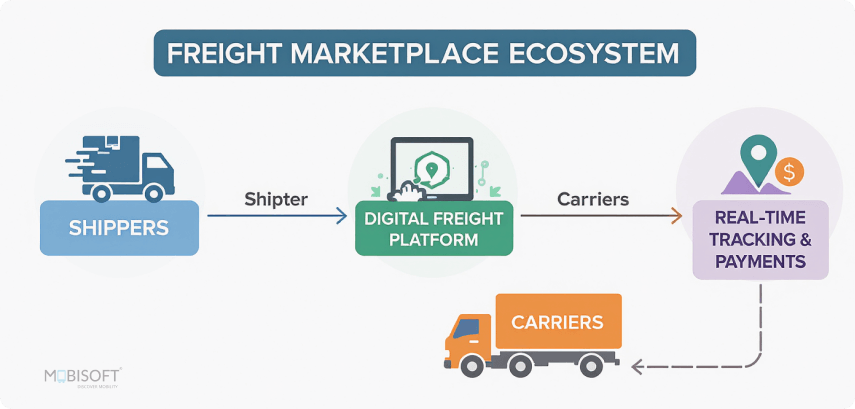
Freight management software is more than virtual brokers. They became integrated systems in which shippers, carriers, insurers, and financiers collaborate via shared APIs and intelligent data links. This approach generates a phenomenon called platform liquidity, which means that as more participants come aboard, the smarter and more efficient the network becomes.
Transport management, compliance verification, and flexible rate analysis now come together via cloud-based solutions in a single, user-friendly interface, providing a business with a comprehensive view of its operations. Firms can rapidly discover pockets of capacity, optimize routes, and manage risk with a single, separate system or more.
By transitioning from networks to ecosystems, digital freight marketplaces for small businesses provide not just coordination but a competitive advantage. Firms realize speed as well as insight, making freight management more than just a collection of simple tasks, but a linked operating plan built on digital freight marketplace innovation.
Explore how on-demand trucking apps are reshaping connected logistics and real-time freight delivery.
Building Trust and Transparency in Digital Freight Platforms
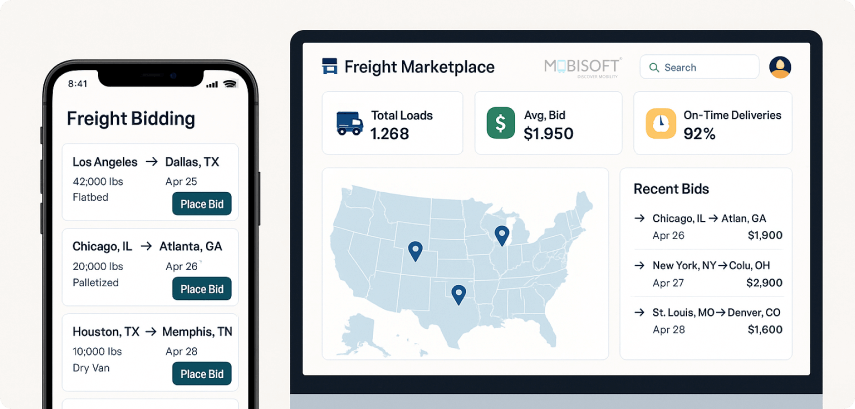
Trust Architecture Builds Confidence
Even with high-tech automation, humans still must trust one another. Digital freight marketplaces rely upon transparent scoring, as well as reputation information, so that shippers will trust carriers, and carriers will trust shippers. Certified credentials, compliance verification, and easy performance measures create more trustworthy decision-making.
Transparent Systems Reduce Friction
Real-time reports and clean dashboards help simplify complex projects. One can instantly view where shipments are, costs, as well as compare carriers. Being transparent decreases disputes as well as stabilizes service quality across the network. These transparency-driven mechanisms reflect how digital freight marketplace trends are improving industry credibility and operational control.
Experience Parity Simplifies Adoption
B2B platforms are applying app design concepts that everyone uses on a day-to-day basis. Intuitive interfaces, simple workflows, and phone accessibility enable logistics groups to make fast, spontaneous decisions with minimal training. This focus on user experience enables everyone within an organization to utilize the platform and remain engaged. Built around usability and trust, it strengthens the future of the digital freight marketplace.
Stay ahead with insights on logistics technology trends shaping the future of digital freight visibility.
Emerging Business Models and Investment Patterns
Subscription Intelligence and Freight-as-a-Service
- Emerging digital freight marketplaces for small businesses are generating revenue beyond classic transaction fees.
- Subscription-based packages of intelligence offer analysis and data to maximize shipping choices.
- Freight-as-a-Service enables companies to use on-demand transport capabilities without owning assets, with flexibility as a cost-saving benefit.
Embedded Insurance and Financing
- Some digital freight marketplaces for shippers provide insurance and financing as a service offering.
- This service helps shippers as well as carriers manage risk as well as finances, which, in turn, makes it a smoother ride for everyone.
- Besides, services like 'Buy Now, Pay Later' options allow small and mid-sized businesses to better manage their cash flow.
Investment and Market Consolidation
- Capital and acquisitions are transforming the freight tech landscape.
- New North American, European, and Asian companies are receiving investment, both for operating better and also for the distinct data they produce.
- Data from such platforms offers a valuable asset, allowing such platforms to compete more favourably than established companies.
Freight marketplaces are revolutionizing the logistics business by combining fresh business concepts with strategic investment. Firms are investing in these digital freight marketplaces after realizing their efficiency and simplicity. Moreover, it offers valuable insights about the business that help understand the market better, proving the value of digital marketplaces for freight forwarders as a long-term growth driver.
Future Trends: Autonomous and Predictive Digital Freight Platforms

Digital freight platforms aim to become automated. In just a decade, the logistics industry will involve no human intervention. AI implementation will save money and support environmental goals. Routing algorithms will include sustainability measures directly, making carbon efficiency a part of operational choices instead of a separate aim. These platforms will unify the operations of financiers, shippers, and carriers while learning and improving simultaneously.
Businesses will gain insights into capacity, risks, and costs, helping them make smarter decisions and solve problems. The sustainability will be services-based. Firms will demand carbon intelligence as a key component of their activities, connecting environmental concern with business advantage. Predictive analysis will aid firms in planning nearshoring or other paths to remain resilient while decreasing emissions.
By combining autonomy, predictive analytics, and sustainability, internet marketplaces will evolve from simple freight utilities to engines of more intelligent trade.
Learn more about transportation and logistics solutions driving predictive freight automation.
Redefining Freight in the Digital Era
Digital freight marketplaces are transforming how companies manage logistics today. They bring together people, information, and workflows to create a single smart system. These systems use connected IoT networks and predictive data analytics to help companies identify issues. This optimizes the delivery process and helps us take a step closer to sustainability.
Companies positioning freight as a key asset, rather than purely an expense, will and are in fact gaining a long-term advantage. Implementing these tools helps businesses remain agile, overcome challenges, and make better decisions. The result is seamless operations and long-term success, which is crucial in this dynamic global supply chain.
Key Takeaways
- Digital freight marketplaces allow different parts of the supply chain to work together, a better alternative than traditional brokerage practices.
- It has been made possible by digital freight matching platforms that improve overall control for both the shippers and the carriers.
- Organizations are moving to algorithm-based electronic matchmaking platforms. These custom solutions improve efficiency and offer crucial insights.
- Smart freight solutions that use AI, predictive analytics, and blockchain help in resource management and optimization, apart from analyzing efficient routes and better prices.
- Trust and transparency remain key, with real-time dashboards, scorecards for performance, and consumer-friendly interfaces continuing to boost end-user confidence and adoption.
New models such as Freight-as-a-Service, subscription-based intelligence, and embedded finance are transforming digital freight platform benefits and value-creation models.

FAQs
How do digital freight platforms make operations more efficient?
These systems use automation to match loads, simplify booking steps, and provide live tracking. This cuts down on mistakes and reduces extra paperwork. Several freight companies today use artificial intelligence to plan better truck routes, cutting down on empty trips and saving fuel, showing the practical edge of digital freight marketplaces in logistics.
How do digital freight platforms support sustainability?
Digital freight marketplaces are embedded with AI and data analytics that analyze and offer the best possible route. It also combines shipments based on real-time data. This reduces fuel usage, helping the environment directly while improving operational margins.
What are the costs involved in using a digital freight marketplace?
Smart freight solutions indeed cost you significantly, but that is because of the digital freight marketplace future value they offer. It provides a great package of features that reduce operational costs, time, and effort, which are highly profitable in the long run.
How do these platforms deal with compliance and regulations?
Digital freight marketplaces now include compliance checks within their systems. They handle documentation and ensure shipments follow local and global rules. This lowers the chances of facing fines and ensures consistent performance across markets.
How do digital freight platforms influence customer satisfaction?
These platforms boost visibility and dependability using tools like live tracking and issue resolution features. This helps create better customer experiences and keeps customers loyal, underscoring the digital freight platform benefits in modern logistics.

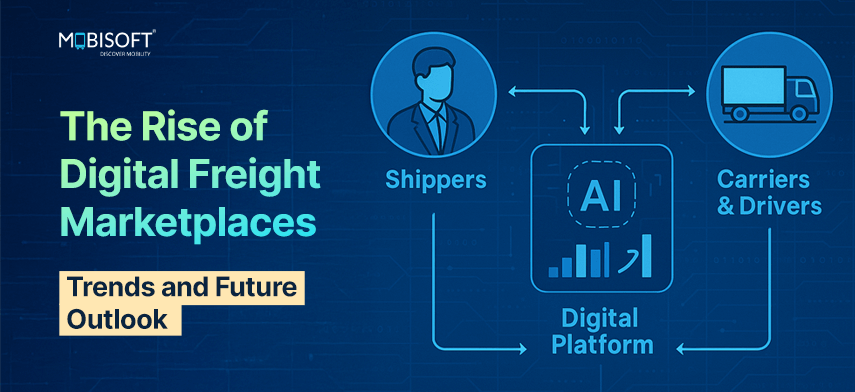


 October 30, 2025
October 30, 2025


